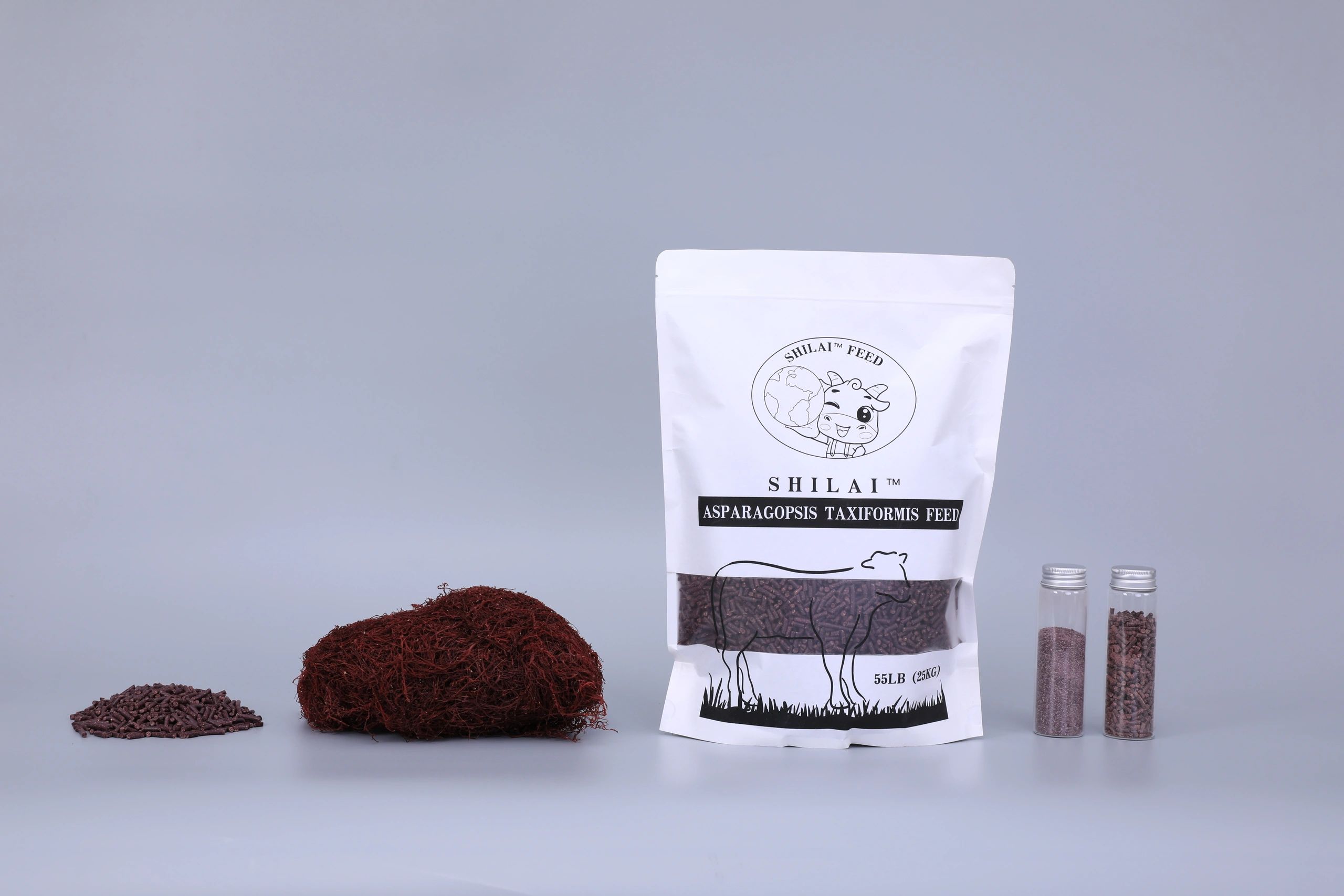Global farming activities are responsible for a large share of greenhouse gas outputs, driven mainly by animal production.
Due to its much greater warming potential relative to carbon dioxide, methane emissions are a high-priority target for mitigation.
Asparagopsis taxiformis, an oceanic red alga, shows potential as an effective strategy to reduce methane emissions from animals.
The seaweed’s active substance disrupts microbial methane production in the rumen, cutting animals’ methane emissions.
Integrating Asparagopsis taxiformis into livestock feed has demonstrated favorable results in initial research, indicating potential to reduce agricultural emissions.
- Asparagopsis taxiformis additionally supplies complementary benefits that enhance its appeal for agriculture.
- Elevated animal welfare and condition
- Possibility of new coastal agribusinesses and local employment
Additional scientific and practical work is necessary, but Asparagopsis taxiformis stands out as a promising pathway to greener livestock production.
Exploring the Commercial Promise of Asparagopsis taxiformis Powder as a Feed Ingredient
Powdered Asparagopsis taxiformis offers a convenient avenue to integrate its methane-cutting properties into commercial feeds.
The species supplies both nutritional elements and bioactives that contribute to enhanced livestock performance.
Adding A. taxiformis powder to formulations has produced methane reductions in experiments and may enrich feeds with vital micronutrients.
Further rigorous research is crucial to optimize dosage, processing, and long-term safety to unlock full commercial potential.
Asparagopsis taxiformis and the Next Era of Sustainable Animal Production
Asparagopsis taxiformis is drawing recognition for its ability to help resolve the environmental impacts of standard animal farming.
Integrating the algae into feeds may allow producers to substantially reduce on-farm methane emissions and environmental impacts.
Beyond emissions, studies indicate Asparagopsis may also improve animal health and productivity metrics in some contexts.
Large-scale implementation and chronic impact assessment remain to be proven, yet preliminary results are highly encouraging.
Curbing Enteric Methane via Asparagopsis Feed Inclusion

Asparagopsis species have emerged as a promising avenue for lowering methane emissions from ruminant animals.
The seaweed’s effect stems from its ability to inhibit methanogenesis, the microbial process that creates methane in the rumen.
- Academic trials have recorded significant methane decreases for animals fed Asparagopsis under experimental conditions.
- The strategy of adding Asparagopsis to feed aligns with sustainable agricultural practices for emissions reduction.
- Farming operations are starting pilot projects to assess the adoption of Asparagopsis in feeds.
Asparagopsis: Seaweed Fueling Sustainable Change in Animal Agriculture
Ocean-sourced Asparagopsis taxiformis is gaining recognition for its capacity to reduce methane in ruminant digestion.
- Experimental feeding of Asparagopsis yielded large methane reductions, suggesting important environmental gains.
- The development offers a hopeful route to balance food security and environmental protection through methane mitigation.

As global efforts intensify to find sustainable climate solutions, Asparagopsis stands out as a novel and actionable option for livestock methane mitigation.
Refining Asparagopsis taxiformis Feed Strategies to Improve Methane Reduction
Studies concentrate on ideal handling, formulation, and application rates to make A. taxiformis-based feeds most effective.
The Science Behind Asparagopsis taxiformis's Methane-Lowering Effects

Mechanistically, Asparagopsis acts on methanogens in the rumen, disrupting the biochemical pathways that generate methane.
The seaweed’s methane reduction is associated with bromoform compounds, which are under active investigation for mechanisms and risk assessment.
Designing Feed Blends with Asparagopsis to Enhance Farm Sustainability
Asparagopsis offers both nutritive value and active molecules that together justify its consideration for feed formulations.
Integrating Asparagopsis into feeds offers advantages such as additional protein and micronutrients, improved digestion, and potential antimicrobial properties.
Asparagopsis taxiformis as a Nature-Based Path to Greener Food Production
Asparagopsis taxiformis could play a role in reshaping food systems by reducing emissions and enhancing environmental performance.
- In addition, the seaweed contributes essential nutrients and beneficial compounds to diets.
- Scientists and industry experts are actively exploring its uses across aquaculture, agriculture, and food production sectors.
Widespread incorporation of Asparagopsis into feeds could materially lower the environmental burden of livestock farming.
How Asparagopsis Feed Additives Can Improve Animal Health and Performance
Asparagopsis is attracting interest as a supplement that can lower methane and concurrently bolster animal health and efficiency.
Studies report improvements in nutrient uptake and feed efficiency when Asparagopsis is integrated into rations, aiding growth.
Functional benefits like antioxidant and immune-support properties may accompany Asparagopsis use, reinforcing animal health.
With demand for greener livestock increasing, Asparagopsis stands out as a promising option as R&D and industry adoption progress.
Building Methane-Cut Feeds with Asparagopsis for a Lower Carbon Future
With pressure rising to decarbonize food production, Asparagopsis provides a credible option to lower the sector’s greenhouse gases.
- The leading hypothesis is that the seaweed’s constituents suppress methanogenic microbes and disrupt methane synthesis in the rumen.
- Experimental work has shown promising methane decreases associated with Asparagopsis supplementation in diets.
As a feed innovation, Asparagopsis could contribute to more climate-resilient and environmentally conscious food systems.
